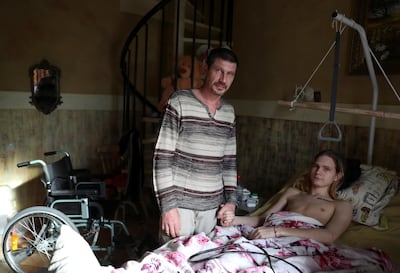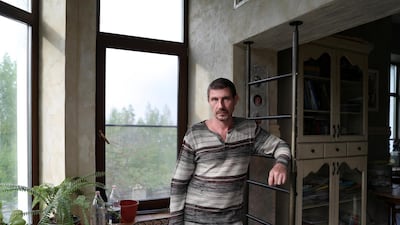Dmitry Bocharov, an entrepreneur and father of five, had burnt through his savings trying to help his injured son when Moscow's coronavirus lockdown set in, cutting off his income overnight.
At a stroke in late March, the Russian capital shut down all businesses except those deemed essential, such as grocery stores and pharmacies. Other regions followed, leaving millions looking for ways to make ends meet.
Mr Bocharov, 46, who owns four hair salons, was already struggling after his son fell out of a window and broke his back in January. Doctors said there was hope surgeons could fix the 19-year-old's injuries.
Father and son are now at home because a clinic where the teenager was receiving treatment has been converted into a coronavirus hospital.
Mr Bocharov's salons closed on March 28. His wife and four other children were on holiday in Sri Lanka and were unable to return.
"When the salons closed I had no rainy day fund," said Mr Bocharov. "Thank God there are friends who know my situation and occasionally give me some money so we can buy food and medicine. Life has changed and it's a bit terrifying."
His fate echoes that of many in Russia. Forty-two per cent of households have enough savings to maintain essential spending without borrowing for only a month, according to a poll by independent Moscow-based think-tank NAFI in March.
Three-quarters of people who borrowed money in the second half of April did so to cover everyday needs, another poll, commissioned by the Russian central bank, showed in early May.
Facing an economic contraction of up to 6 per cent this year and with the second highest number of infections in the world, authorities have ruled out providing people with so-called "helicopter money".
President Vladimir Putin initially ordered companies to keep paying salaries during the lockdown, something not all businesses could afford. He later unveiled support for businesses and families with children in severe hardship.
Yandex, Russia's leading search engine, said searches for how to claim unemployment benefit skyrocketed in mid-March. The self-employed and those not officially fired are not entitled to state support.
Announcing a gradual easing of lockdown measures on Monday, Mr Putin said unemployment had doubled to 1.4 million in a month.
That figure could rise to around 7 per cent in April from 4.7 per cent in March, said Natalia Orlova, chief economist at Alfa Bank.
"But what is more dangerous is the situation when people are told that they are on unpaid leave while lockdown measures are in place, meaning they can't apply for unemployment compensation even though they have no incomes," she said.

Andrei Garan, a 33-year-old entrepreneur in the taxi business in Tula, a city south of Moscow, said bookings had all but dried up in April, leaving him with almost no savings.
That, he said, had forced him to moonlight by doing construction work.
"The situation in which ordinary people find themselves is outrageous. There is no income," said Mr Garan, adding that he had cut spending to a minimum.
In April, consumption of services in Russia shrank by nearly 60 per cent to 2007 levels, said Russia's largest bank, Sberbank.
Central Bank Governor Elvira Nabiullina has warned that loan arrears and bad debt will grow. Individuals and companies most vulnerable to the crisis owe banks about $256 billion, a third of their overall credit portfolio.
Household incomes and employment may recover somewhat in the second half of 2020, but consumer demand this year is likely to shrink by 6 per cent, Raiffeisen Bank analysts said.
"I've been in this business for 17 years. We've seen different times, but been able to live on what money we had and have children," said Mr Bocharov.
"Now I understand I will lose part of my business."

